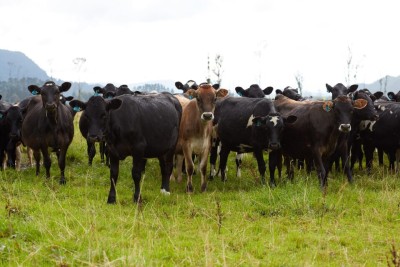 OSPRI now delivering operations for Mycoplasma bovis Programme
OSPRI now delivering operations for Mycoplasma bovis Programme
OSPRI is now responsible for the delivery of the day-to-day operational and disease control functions of the Mycoplasma bovis (M. bovis) Programme.
From 1 November 2023, we are delivering:
- allocation and oversight of testing
- the two background surveillance programmes
- managing the currently active confirmed properties and any newly detected farms
- depopulation of infected farms, or trace animals
- providing support for affected farmers.
Programme partners, Ministry for Primary Industries (MPI), Beef + Lamb New Zealand, and DairyNZ, will continue to govern and monitor the Programme’s progress as is required under the Government Industry Agreement. MPI will retain non-operational aspects of the Programme, including compensation, and any necessary compliance action.
Farmers and other stakeholders shouldn’t notice many differences with the change and M. bovis levies will not change.
There are currently two Active Confirmed properties, adjacent dairy farms in Selwyn. We are working closely with the affected farmers to depopulate the properties and support them through this process.
There are strict movement controls and conditions placed on the properties to ensure any potential risk of infection spread is managed, as well as sampling/testing of cattle on neighbouring farms and properties connected to the property.
Depopulation, cleaning and disinfection and the 60-day stand down period for both properties is expected to be completed in early 2024.
Work to focus on surveillance to support eradication
The Programme is now more than halfway into an estimated 10-year plan to eradicate M. bovis. The number of infected properties has fallen to very low levels and the major activity of the Programme in coming years will be national surveillance of New Zealand’s cattle herd. Moving operations from MPI to OSPRI at this stage of the eradication effort will provide the best value for the programme funders and farmers.
A significant portion of our M. bovis team has come over from MPI, bringing with them invaluable Programme knowledge and expertise and experience in disease control.
Proposed National Pest Management Plan
The Programme is currently being administered by the Programme partners under a Government Industry Agreement.
A proposal is under way to change the administration model to a National Pest Management Plan – the same model used for bovine tuberculosis (TB).
The proposal nominates OSPRI as the lead agency to deliver the programme for the remainder of the eradication plan. Public submissions on the draft proposal closed in October 2023. The final proposal is expected to be submitted to the Government for review in 2024.
You can find more information about the proposal on the MPI website.
 Meet Paul Reynolds – OSPRI’s new Board of Directors, Chair
Meet Paul Reynolds – OSPRI’s new Board of Directors, Chair
OSPRI’s new Board of Directors, Chair Paul Reynolds has been around the traps for a long time. Growing up in Gisborne, Paul was on and off farms all throughout his childhood, taking on jobs from tallying at the freezing works to hunting possums for some extra pocket money. He then moved down south to Otago to complete his BSc(Hons) and then his PhD in Biochemistry, which led to a 20-year career as a research scientist.
What excites Paul most about joining OSPRI is his interest in seeing how science can provide the tools to empower farmers to better manage their land and stock to help deal with pests and disease. “OSPRI is an organisation that's right at the cutting edge between farm science and productivity. It's got stakeholders from the primary industry and the Government who are very interested in the Board appointments and challenging the organisation to remain focused and relevant to farmers”.
One tool of interest that Paul will be focusing on is OSPRI’s new online customer portal, MyOSPRI. “At the heart of OSPRI is our IT systems. These systems give us a platform that will be of enormous use to farmers. I'm certain we're on the right track, and that ultimately what we deliver to farmers will be a set of services and a platform that will see them well-served and see their resilience in a very difficult and changing environment rewarded”.
Paul is no stranger to the inner workings of government. He has held a range of senior positions within the public sector including Chief Policy Advisor at the Ministry of Research, Science and Technology, Deputy Director-General (Policy) at the former Ministry of Agriculture and Forestry (MAF) and then Chief Executive at the Ministry for the Environment.
In 2015, Paul retired from the public sector and moved into governance and consulting. He’s currently the Chair of AgResearch and the Deputy Chair of Manaaki Whenua - Landcare Research.
This experience in the primary sector, the public sector and governance makes Paul a great fit. Interestingly, back when Paul was first at MAF, he was responsible for negotiating some of the earlier arrangements between the then Animal Health Board, the Government and industry partners for the funding of TB Pest Management. Joining OSPRI was like returning home. “It’s very much a homecoming for me to do something that connects me right back to my roots”.
OSPRI is governed by a Board of Directors, currently with 6 directors. These positions are appointed by the shareholders on the basis of recommendations by the OSPRI Stakeholders’ Council. The decisions made by the Board help shape the direction that OSPRI takes as an integrated disease management agency.
Paul succeeds long-standing Chair Barry Harris, who has been on the OSPRI Board of Directors for nine years and Chair since 2018. Barry was involved in the original set up of OSPRI while with DairyNZ, and led the organisation through several major changes throughout his time as Chair including the recent M. bovis transition. Barry continues to chair a number of other boards, including NIWA and Food Innovation Waikato.
 Your feedback matters - Help improve our NAIT scheme education
Your feedback matters - Help improve our NAIT scheme education
As part of the NAIT National Education Project, we’ve designed 5 education modules to help farmers understand their NAIT obligations.
The modules help to understand what these NAIT obligations involve, and why they’re crucial to traceability and disease management.
You can view the modules using the link below.
As part of further developing and continuously improving our educational content, we are wanting to hear from those who have used our NAIT education resources.
We're looking to get an idea of how people want to learn and what works best for them, so we can ensure that any education material released is fit for purpose.
If you've used our educational material and have some feedback, feel free to fill out the survey in the link below.
 Molesworth – progress towards TB eradication on New Zealand’s largest station
Molesworth – progress towards TB eradication on New Zealand’s largest station
Molesworth Station is New Zealand’s largest working farm, spanning 180,787 hectares in the mountainous and scenic landscape of the South Island high country.
For 36 years, the station has been home to the longest-standing TB-infected herd. The station has been a focal point for a 9-year programme involving targeted herd TB and wildlife surveillance, farm and stock management, possum control, and innovative research initiatives.
Given the long-standing TB presence in both the Molesworth cattle herd and wildlife, a comprehensive approach has been necessary. This includes ground-based pest control, aerial 1080 operations targeting possums, intensive on-farm herd testing, carcass inspections at slaughter, and controls on animal movements off the farm.
OSPRI recently completed what we intend to be the final planned TBfree 1080 aerial operation at Molesworth Station. Since 2017, we've been carrying out an intensive TBfree aerial possum control programme, supported by ground control operations in the Bush Gully, Tarndale, and Acheron East areas, working hard to eradicate TB at Molesworth Station.
The 2023 aerial operation in October represents a significant step forward, signalling the beginning of the end of Molesworth's battle with TB. The goal with this cycle of aerial operations was to rapidly reduce possum numbers and maintain them at a low level, aiming for the long-term benefit of eliminating TB not only in possums but also in other animals like deer, ferrets, and feral pigs.
The work completed in Yarra and Five-mile concludes our planned aerial operations for now. We'll monitor the success of the aerial operations in reducing possum numbers, and if successful, TBfree aerial operations will provisionally conclude at Molesworth. Ground-based activities, including trapping and monitoring possums, wildlife surveillance of pigs and ferrets, and ongoing herd testing, will continue.
Over the next 5 years we will monitor wildlife for any signs of TB, and livestock through annual testing and surveillance at slaughter. Providing we do not identify any new TB infection originating from wildlife, the 2023 aerial could be the final TBfree aerial in Molesworth’s journey.
The surrounding areas
Molesworth Station is not the only area that is at risk from TB infection, and the neighbouring areas also benefit from the work completed by the TBfree programme. Decades of hard work has been going on behind the scenes to overcome TB and we’re working with the local community to help eradicate the disease.
The video below provides deeper dive into what’s been happening in the high country recently.
 Happy holidays from the team at OSPRI
Happy holidays from the team at OSPRI
After another busy year, we will be taking a break over the holidays.
Our offices, including our support centre, will be closed for Christmas from 12pm on 22 December 2023. We will reopen at 8am on 8 January 2024.
For any animal welfare or biosecurity emergencies, leave us a voicemail and we will return your call as soon as possible. For non-urgent matters, send us an email at info@ospri.co.nz.
If you need support over the holiday period, our website has plenty of useful resources that may be able to help. Check out the page below for links to the most commonly accessed topics.

